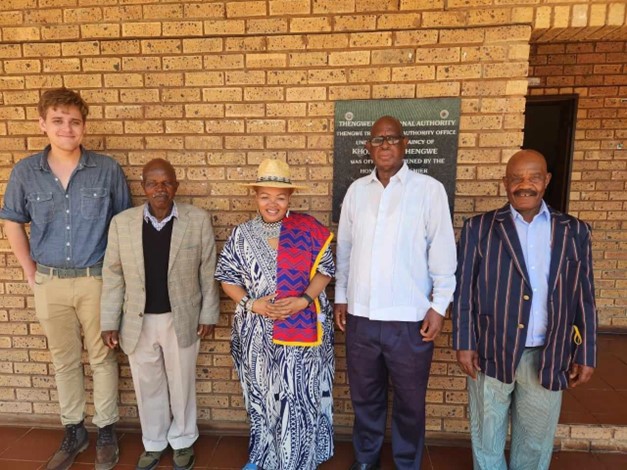Summer in the Field: Documenting Whistled Languages in South Africa

We arrived at the traditional chief’s palace with two buckets of KFC chicken, soft drinks and the cash equivalent of $15. Chief Nethengwe nods, accepting the ya nduvho “of praise” that is expected for meeting traditional leaders in this area of South Africa. Chief Nethengwe asks us why we have driven seven hours’ north of Johannesburg to Thengwe, and listens intently as we explain that we are researching the undocumented whistled language of the Vend̯a people.
In communities found around the world, people communicate and hold full conversations just by whistling. The Venda people should be counted in this roster, with that morning’s gas station attendants whistling back and forth across a parking lot like birdsong. Manaseh Tshiguvho, the Vend̯a-speaking researcher working on the team, translated quickly as the conversation continued. These workers were whistling words and sentences as effortlessly as speaking, asking each other about their families, giving work instructions and making jokes. This practice is considered so ordinary that many Venda people are surprised to learn that most of the world can’t do this.
The linguistic interest in such registers is multifaceted. Communicators have to somehow turn a spoken utterance into whistling while preserving enough linguistic information that a listener can decipher the meaning. Two general strategies have been identified for whistled languages so far: tonal languages straightforwardly rely on their tones, while non-tonal languages tend to resort to distinguishing vowels on different tones and modifying the pauses between the vowels to distinguish different consonants. The present research suggests that the whistled register of the TshiVend̯a language does both. The two tones (high and low) are whistled straightforwardly as they come in the sentence, but the spaces in between the tones vary depending on what the consonant is: sounds like /p t k/ have relatively long pauses, while /h/ has no pause at all and the /y/ glide bounces the whistle up to the top of the pitch range. These types of details vary widely across different whistled languages of the world, and are learned through socialization.
The vast majority of known whistled languages are barely attested, with their structure, discursive uses and cultural context virtually unknown to academics: whistled TshiVend̯a was described in one sentence by musicologist Percival Kirby in 1937, with no subsequent work until now. Other whistled languages exist with no apparent attestation at all. This is the case for Xitsonga-speaking students at the University of Venda who whistled their language just as easily as the TshiVend̯a speakers – a completely undocumented whistled language warranting further research.
Conversely, two whistled languages are relatively well-researched: Silbo Gomero in Spain and the whistled language of Kuşköy in Turkey. Academic articles on these two languages span the past 60 years, and have substantially impacted the trajectory of those registers which were once in decline. Academic legitimization and growing media acclaim led to policy changes such as introduction of the languages into local schools as an academic subject and investment by governmental tourism departments. Whistled Spanish and Turkish followed similar trajectories, culminating in Silbo Gomero’s inclusion on the UNESCO list of Intangible Cultural Heritage in 2009, shortly followed by whistled Turkish in 2017.
Back in South Africa, whistled TshiVend̯a is not currently on such a list, but perhaps it should be. As part of my 2023 Summer in the Field Fellowship, I conducted interviews and linguistic experiments to research how TshiVend̯a works at a technical and conversational level. Given the possible endangerment of the whistled register of TshiVend̯a and its role in traditional education systems, this research offers the opportunity to explore fully incorporating the Indigenous pre-colonial curriculum into modern education systems in African societies and for the language to receive recognition by global cultural institutions, like UNESCO.

Chief Nethengwe, having patiently listened to our explanations, paused before saying, “So, how can I help you now?” We replied that we would like to meet whistlers from the area. The project had thus far consisted of running linguistic experiments on TshiVend̯a college students living in the city, recording them individually whistling predetermined sentences in a quiet room. However, we had neither met with older whistlers, nor documented whistled TshiVend̯a in a natural state of conversation. In no time, we heard two of the local village headmen (traditional mayors), Mr. Bebeda and Mr. Maranda, standing outside the Tribal Authority office practicing their whistling. Instructions requesting a stilted conversation with time to translate were quickly abandoned as the smiling elders fell into a more organic whistled conversation 100 yards apart asking how each other’s day was and giving instructions on what they should be doing.
A Vend̯a audience might find this all to be unusual. As prevalent as whistling is in Vend̯a communities, there are several social rules governing the practice. Women rarely whistle, though they usually understand it. Whistling isn’t allowed indoors, at night or at funerals. Young men whistle extensively with their friends, and even develop lingo specific to friend groups, much like spoken slang. However, they are expected to grow out of the practice as they get older, and older men rarely whistle. Yet, whistling to animals is always allowed – women can whistle to call cattle, old men whistle to call dogs. Whistling also isn’t allowed around traditional leaders, according to Chief Nethengwe. The sight of two older Venda men in positions of leadership whistling a full conversation in front of their chief was as rare as two American researchers showing up to ask about whistling. Fulfilling the chief’s request apparently superseded all else.
This also might be a case of the observer’s paradox, where linguistic behavior changes when under observation. But then, so would be the endemic revaluing of whistled Turkish and Spanish following academic interest, prompting locally driven policy changes to protect and preserve cultural heritage at risk of being lost. The use of whistled TshiVend̯a is in decline, according to Professor Nthambeleni Netshisaulu, a linguist at the University of Venda, echoing a local consensus that it is fading fast in urban areas. However, as of now, this culture remains vibrant.
*
Learn more about the Summer in the Field Fellowship Program.